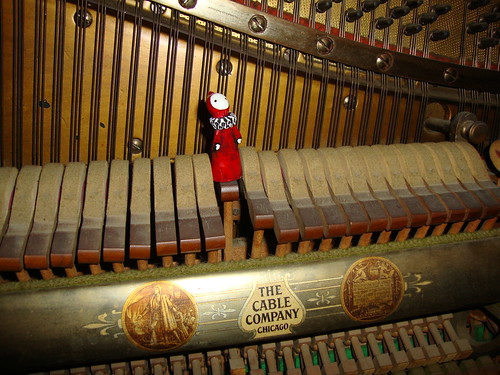Summary (courtesy of
GoodReads):
When Richard Mayhew stops one day to help a girl he finds bleeding on a London pavement, his life is forever altered, for he finds himself propelled into an alternative reality that exists in a subterranean labyrinth of sewer canals and abandoned subway stations. He has fallen through the cracks of
reality and has landed somewhere different, somewhere that is Neverwhere.
And here's what I thought: That summary above doesn't do enough justice to this book, but I suppose it'll suffice. And heck, you can read an entire
Wikipedia entry about this book. It's better to add this to it, I think:
What if your city (any city) had a distinct second-city beneath it, which was filled with all sorts of magical, fantastical, and sometimes quite horrifying things? Imagine you were having a somewhat normal evening, and then fell into this "under-city", finding that life as you knew it would never recover, and never be the same.
This is one of my all-time favorite books, hands-down. I think this might be my 5th time re-reading it (I don't really keep track), and every time I read it, I just love it so much. There are so many things in this book that I really enjoy: the various characters, and how interesting they are (more on that in a moment), the amazing storytelling that I always get from Neil Gaiman, and also, the idea of the city under a city. I've been in London, and I really, really love imagining London Below, and all the things I might find there.
So, the characters --- Richard Mayhew is our main character, and he's a sort of everyman (at least, on the surface), but it's hinted at early on that there's more to him than meets the eye. He's definitely the ordinary man who becomes a hero, and I always get the impression that he's been waiting his whole life for an adventure like the one he finds when he meets Door. Door, the daughter of the Lord Portico, has a gift to open doors --- not just what she sees in front of her, but hidden doors, which sometimes open up into distant places. We also have a whole supporting cast of other fascinating characters --- and what makes them especially interesting to me is that it's difficult to tell at times if they are good or bad. Some seem to be perfectly nice on the surface, and then their real intentions are revealed. Others, like the Marquis de Carabas, is definitely one to keep your eye on because it's very difficult to tell what he might be up to.
And then, there are the truly nasty characters: Mr. Croup and Mr. Vandemar. They're perfectly horrible, and I really enjoy them.
If you've read the book, that statement should make sense. They are frightening, and horrifying, and yet, they have their own charm. They ooze a loathsome sort of good manners, always polite when they're about to do something vicious. And there's a sense of dark humor about them that I always quietly delight in (
because to loudly delight in such a thing would be somewhat off-putting ... and odd). They're truly awful ... but so awfully interesting.
As I mentioned, the storytelling in this book is just absolutely fantastic. Every time I read this book, I just savor it --- it's like eating the most wonderful food imaginable, or drinking the absolute best wine ..... I just delight in it. The first sentences of the book don't really hint at anything too remarkable, but as the story gets going, it just gets more and more fantastical and descriptive. I know this book was published in 1996, and I'm not sure what was going on in Neil Gaiman's life when he wrote it, but I imagine him smiling to himself as he crafted these descriptions of people and places, and filled this book with incredible imagery.
This is a book I recommend often, especially to people who come into my library looking for a good book. Inevitably, they are readers who have never read much fantasy, thinking that fantasy is all about dragons, and wizards, and magic. I always introduce them to this author, and this book --- because here, magic is in the small details. There is adventure here, and heroism (and cowardice). There are characters that stay in your mind long after you've finished the story, and to me, that makes it a wonderful book. It doesn't smack of "fantasy," but rather, I think, of a feeling of being privy to a world you never knew existed, but always maybe suspected was there, in the dark corners, just out of range, where you might see a shadow and imagine what it is. To read this story is to be delivered into a world you may have never imagined existed, but can perhaps completely believe in.
First sentences: The night before he went to London, Richard Mayhew was not enjoying himself. He had begun the evening by enjoying himself: he had enjoyed reading the good-bye cards, and receiving the hugs from several not entirely unattractive young ladies of his acquaintance; he had enjoyed the warnings about the evils and dangers of London, and the gift of the white umbrella with the map of the London Underground on it that his friends had chipped in money to buy; he had enjoyed the first few pints of ale; but then, with each successive pint he found that he was enjoying himself significantly less; until now he was sitting and shivering on the sidewalk outside the pub in a small Scottish town, weighing the relative merits of being sick and not being sick, and not enjoying himself at all.
More writing that I like better than the first sentences: "I am impressed. What a brain, Mister Vandemar. Keen and incisive isn't the half of it. Some of us are so sharp," he said as he leaned in closer to Richard, went up on tiptoes into Richard's face, "we could just cut ourselves." p 29, when Richard meets Croup and Vandemar for the first time.

 Thoughts on the cover art:
Thoughts on the cover art: My hardcover edition has the cover art at the top of this post, and I really like it because it gives the clear idea of a London Above and a London Below, and has a somewhat moody feel about it that suits the story. However, other editions also have nice cover art:
If you're interested, this book was made into a graphic novel, and also into a television series.






























